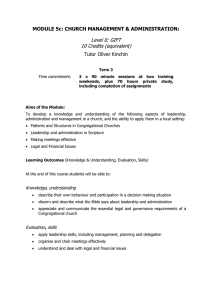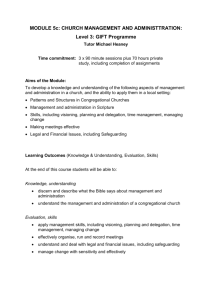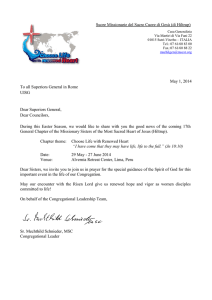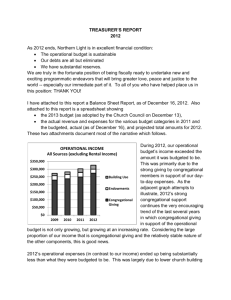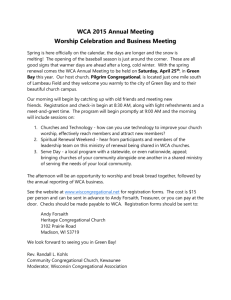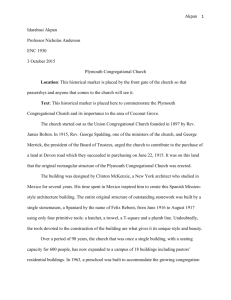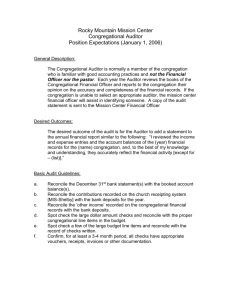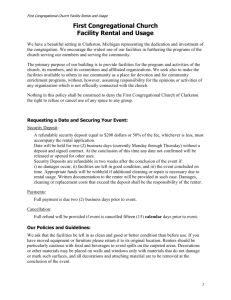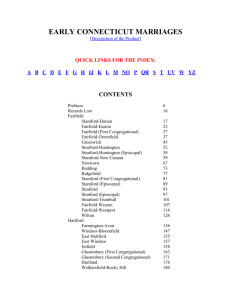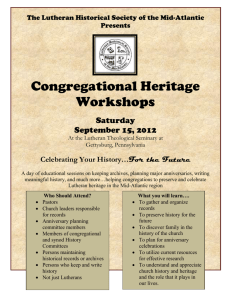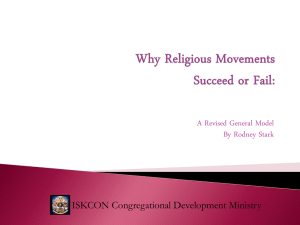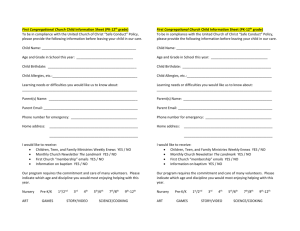Module R2/PT/2911
advertisement
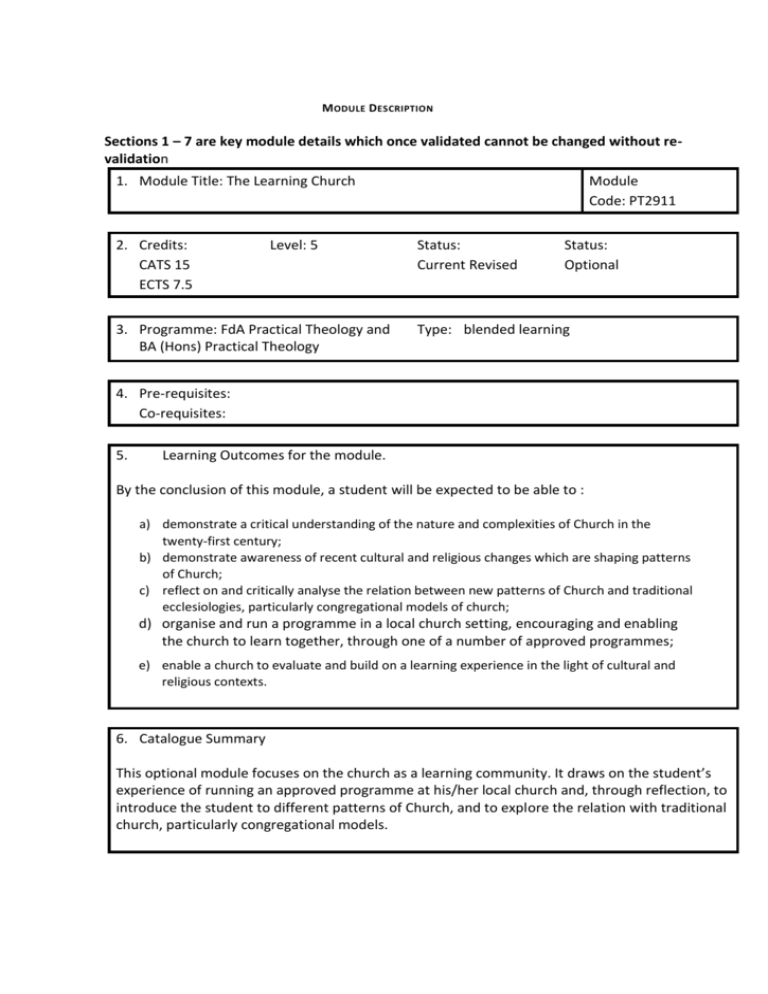
M ODULE D ESCRIPTION Sections 1 – 7 are key module details which once validated cannot be changed without revalidation 1. Module Title: The Learning Church 2. Credits: CATS 15 ECTS 7.5 Level: 5 3. Programme: FdA Practical Theology and BA (Hons) Practical Theology Module Code: PT2911 Status: Current Revised Status: Optional Type: blended learning 4. Pre-requisites: Co-requisites: 5. Learning Outcomes for the module. By the conclusion of this module, a student will be expected to be able to : a) demonstrate a critical understanding of the nature and complexities of Church in the twenty-first century; b) demonstrate awareness of recent cultural and religious changes which are shaping patterns of Church; c) reflect on and critically analyse the relation between new patterns of Church and traditional ecclesiologies, particularly congregational models of church; d) organise and run a programme in a local church setting, encouraging and enabling the church to learn together, through one of a number of approved programmes; e) enable a church to evaluate and build on a learning experience in the light of cultural and religious contexts. 6. Catalogue Summary This optional module focuses on the church as a learning community. It draws on the student’s experience of running an approved programme at his/her local church and, through reflection, to introduce the student to different patterns of Church, and to explore the relation with traditional church, particularly congregational models. 7. Assessment Pattern Essay (2500 words) Project Report (1500 words) Weight % 67 33 Pass Req Agg Comments The assessment includes evidence in the form of participant evaluations of the programme. These must be present for the assignments to be passed. Comments may be made for the student’s formation for ministry, but they do not contribute to the word count or mark 8. Indicative Tutorial Team Rev Dr Graham Adams Rev Sara Iles 9. Indicative Learning and Teaching Activities Activity Type HESA Category Lecture Scheduled Seminar Tutorial Practical classes and workshops Supervised time in studio/workshop Fieldwork External visits Work-based learning Project supervision Demonstration Sub-Total Placement Placement Year abroad Sub-Total Guided independent study Independent 15 credits x 10 notional hours = 150 hours Total Hours Hours 3 3 3 0 0 50 0 0 0 0 59 0 0 0 91 150 10. Sample Assignments Assignment 1 (2500 words) The emphasis on the nurture of genuine Christian community where the members of it take responsibility for its growth and well-being as well as its organisation suggests at the very least that emerging church aspires, even if unwittingly, towards something akin to the Congregational Way’ (Robert Pope, ‘Emerging Church: Congregation or Aberration’, International Congregational Journal, 7.2). Discuss, giving examples from at least three different situations of Emerging Church. OR Give an account of the cultural and religious changes in the twentieth and twenty-first centuries in Britain that have given rise to the phenomenon described as Emerging Church. Assignment 2 (1500 words) Following your experience of teaching the programme at your own church, use one model of the Pastoral Cycle to reflect on and evaluate its impact. Indicate which model you are using and what sources you have used for the evaluation. You should draw on participants’ evaluations and reflections in the way described in the module notes, but these do not form part of the word count. 11. Indicative Outline Content This module is based on teaching either Growing Disciples or Mission Shaped Intro at the student’s local church. There are module notes and a guidebook, and three teaching sessions as below: Module Notes Unit 1: What is a learning church? Unit 2: Changes in Faith and Culture Unit 3: Fresh Expressions and traditional churches Guidebook Introduction to the two programmes Running the programme Appendices Teaching Sessions Session 1: What is a church? What is a Congregational church? What is a learning church? Session 2: The place of Faith in Britain today Session 3: Reflecting on the experience of running the programmes (based on assignment 2) 12. Indicative Reading Please note that resources, including course notes/presentations, papers and discussions, as well as access to online journals, are available through the University of Winchester Learning Network: www.winchester.ac.uk. Growing Disciples available from the Congregational Federation Mission Shaped Intro course at http://www.freshexpressions.org.uk/missionshapedintro Anderson, Ray Sherman, An Emergent Theology for Emerging Churches (Oxford: Bible Reading Fellowship, 2007) Brookes, Andrew (ed.), The Alpha Phenomenon: Theology, Praxis and Challenges for Mission and Church Today (London: CTBI Publications, 2007). Carson, D. A., Becoming Conversant with Emergent: Understanding a Movement and Its Implications (Grand Rapids, Michigan: Zondervan, 2005) Cooling, Margaret, Creating a learning church : improving teaching and learning in the local church (Oxford: Bible Reading Fellowship, 2005) Croft, Steven J. L., Transforming Communities: Re-Imagining the Church for the 21st Century (London: DLT, 2002) Greenwood, Robin, Transforming Church: Liberating Structures for Ministry (London: SPCK, 2002) Growing Disciples Phase 2 pamphlet 'Growing Together as a Learning Community' (Nottingham: Congregational Federation, 2010) Hartwell, Becky, Sprouting Churches: The Good Guide to Starting and Improving Work with Children and Young People (Nottingham: Congregational Federation, 2007) Hinton, J. and P. B. Price, Changing Communities: Church from the Grassroots (London: Churches Together in Britain and Ireland, 2003) Hinton, Jeanne and Peter B. Price, Changing Communities: Church from the Grassroots (London, CTBI, 2003) Hinton, Jeanne, Changing churches: Building Bridges in Local Mission (London, CTBI, 2002) Hopewell, J.F., Congregation: Stories and Structures (Philadelphia: Fortress, 1987) Hull, J., What Prevents Christian Adults from Learning? (Philadephia: Trinity Press, 1991) Lees, J., Word of Mouth: Using the remembered Bible for building community (Glasgow: Wild Goose Publications, 2007) International Congregational Journal 6.1 (Fall 2006), Theme: Revisioning Theological Education Morisy, Ann, Journeying Out: A New Approach to Christian Mission (Continuum International Publishing Group, March 2004) Moynagh, Michael, Changing World, Changing Church (Oxford: Monarch, 2003) Moynagh, Michael, EmergingChurch.Intro (Oxford: Monarch, 2004) Orr, Meg, Creative Learning in the Local Church (Grove Spirituality Series, Cambridge: Grove Books, 2005) Oxley, Simon, Creative Ecumenical Education: Learning from one another (Geneva: WCC Risk Publications, 2002) Pagitt, Doug, A Christianity Worth Believing: Hope-Filled, Open-Armed, Alive-and-Well Faith for the Left out Left Behind, and Let Down in Us All (San Francisco, CA: John Wiley, 2008) Ward, Pete, Liquid Church (Carlisle: Paternoster Press, 2002) Whitesel, Bob, Inside the Organic Church : Learning from 12 Emerging Congregations (Nashville: Abingdon Press, 2006) Wuthnow, Robert, After the Baby Boomers: How Twenty- and Thirty-Somethings are Shaping the Future of American Religion (Princeton, NJ, Woodstock: Princeton University Press, 2007) Lees, Janet Word of Mouth: Using the remembered Bible for building community (Wild Goose Publications 2007) Expressions DVD 1. Stories of Church for a Changing Culture, (1 and 2) (Church Publishing House, 2006, 2007) Websites www.freshexpressions.org.uk www.emergingchurch.info
